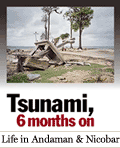Tribals, on their part are unhappy with the shelters made of tin. Attuned to the substantial use of wood in their homes, they are also dissatisfied with the model of the permanent house presented to them by the government.
They fear they will not be able to expand the four-room structure and the construction is incompatible to their age-old style. "The kitchen, bathroom, toilet are below and bedrooms above, whereas we never keep the kitchen near the toilet," says Philip.
"Now they are asking us for our desire so we have presented a wooden model to the government." Besides the pain of losing their homes and villages, there are other hardships caused by the lack of communication, electricity and displacement.
The Nicobarese, known to be hardy people, are also known to control their emotions admirably. And many feel they are coping with loss in their own way.
Samir Acharya, a leading expert on the tribes of Andaman and Nicobar, says some of them have refused compensation for a death because they think it is blood money, while others are squandering it on buying whiskies at Rs 1,200 a bottle.
For a people who lost a large part of their island -- schools, shops, cinema, offices, churches, stadium, harbours -- family and friends, life is gradually taking some shape.
On the road to Mus jetty, children in uniform walk past the 'Erstwhile Perka' board on their way to temporary schools. There couldn't be a better sign of Car Nicobar's journey back from death.

Text: Archana Masih. Photograph: A Ganesh Nadar; Design: Dominic Xavier
Complete coverage: Waves of Destruction
How you can help:
Fund a kid in a daycare, now!